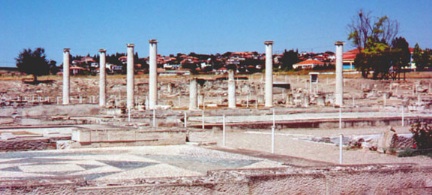 Paul now gets a vision to enter into Greece for missional work, and this means he enters into what we today call Europe. While it is popular to make a big deal of this, it was all the Roman Empire at that time. Paul enters because of a vision about a man from Macedonia (pictured).
Paul now gets a vision to enter into Greece for missional work, and this means he enters into what we today call Europe. While it is popular to make a big deal of this, it was all the Roman Empire at that time. Paul enters because of a vision about a man from Macedonia (pictured).
16:6 They went through the region of Phrygia and Galatia, having been prevented by the Holy Spirit from speaking the message in the province of Asia. 16:7 When they came to Mysia, they attempted to go into Bithynia, but the Spirit of Jesus did not allow them to do this, 16:8 so they passed through Mysia and went down to Troas. 16:9 A vision appeared to Paul during the night: A Macedonian man was standing there urging him, “Come over to Macedonia and help us!” 16:10 After Paul saw the vision, we attempted immediately to go over to Macedonia, concluding that God had called us to proclaim the good news to them.
Missional work involves, at times and probably not for all, listening to the Spirit of God to guide and direct and to set the agenda. We don’t know who this “man” is; we don’t know that he was from Philippi; we do know that Paul sensed that God was calling him to Macedonia.

